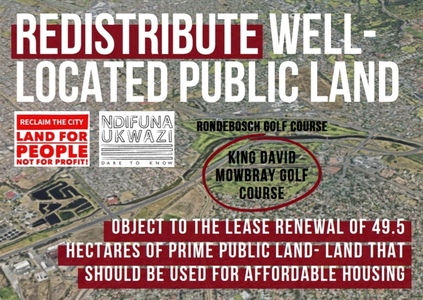Over the last couple of weeks, the City of Cape Town has said that it is experiencing an unprecedented increase in poor people occupying vacant land. The vast majority of people occupy land out of necessity- they have nowhere else to go [3]. And a huge part of why people have nowhere else to go is because the state – at all levels – has failed to satisfy the need for housing or redistribute well-located land.
This failure has exacerbated spatial inequality in Cape Town – which is the most spatially divided city in the country in terms of race and class. The City has consistently blamed this spatial injustice on the lack of well-located land that could be used for affordable housing. But the City often misses the most obvious solution: it already owns massive pieces of land in well-located areas. Land that is unused or not being used to its full potential, that could provide ample space for affordable housing and reverse the City’s apartheid legacy.
Last year, Ndifuna Ukwazi released a research report exposing how the City is disposing of the public land it owns by leasing it to private organisations at massively discounted rentals [4]. This land includes parking lots that are empty for up to 18 hours a day, bowling greens with very few members, and massive golf courses that provide enjoyment to only a few wealthy residents on the weekends. This is an inefficient, exclusive and unsustainable way to deal with well-located public land. Surely this land should be put to better use?
While the City has increased the rental tariff it charges for sporting purposes, which means that it will charge King David Mowbray Golf Course is R11 500 per year (as opposed to the R1 095 a year that it plans on charging Rondebosch Golf Club), this misses the point. Aside from still being an incredibly low rental for this land, it does not address the City’s obligation to redistribute public land. This land-use does not align with the City’s own inclusive development priorities and fails to give effect to the Constitution’s commitment to housing and equitable access to land.
The redevelopment of the land leased to the King David Mowbray Golf Course offers a vital opportunity to act on a new vision for a just and more equal Cape Town. The land could be used to create an inclusive, environmentally sensitive suburb, with a positive urban environment and inclusive green spaces that bring people together rather than tear them apart.
If we are serious about addressing Cape Town’s apartheid legacy, we need to make our voices heard. Object to the lease renewal of this prime public land that should be used for affordable housing before 25 August 2020.
Ndifuna Ukwazi has put together this progressive submission you can use when sending in your own objection. We invite you to use this as a draft and tailor it to make your voice heard. If enough of us send in our objections we can stop the City of Cape Town from renewing the King David Mowbray Golf Course lease.
[1]
https://awethu.amandla.mobi/petitions/cheap-rent-for-the-rich-object-to-the-rondebosch-golf-course-lease-3
[2] City of Cape Town. 24 July 2020. Lease: Erven 29453, 29449, 29455, 32716 Cape Town, Raapenberg Road, Mowbray. Cape Argus. Available:
https://jmp.sh/II39Y3i.
[3] Bosch, Hazell and Clark. 2020. Making Room for Housing. Edited version published by Weekend Argus and IOL News on 8 August 2020. Full version available:
https://jumpshare.com/v/ZMRTKEYftZpoCK8joDOe
[4] Ndifuna Ukwazi. 2019. Cape Town’s Failure to Redistribute Land. Available:
https://drive.google.com/file/d/1Pxly1G47qbC79l58Oss4vKvvK4AO71M-/view

.png)
